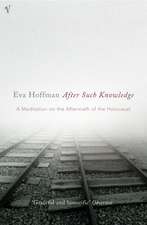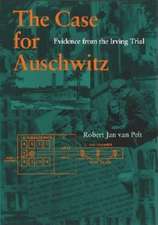The Truth about Fania Fénelon and the Women’s Orchestra of Auschwitz-Birkenau
Autor Susan Eischeiden Limba Engleză Hardback – 6 iul 2016
| Toate formatele și edițiile | Preț | Express |
|---|---|---|
| Paperback (1) | 537.32 lei 6-8 săpt. | |
| Springer International Publishing – 31 mai 2018 | 537.32 lei 6-8 săpt. | |
| Hardback (1) | 572.87 lei 6-8 săpt. | |
| Springer International Publishing – 6 iul 2016 | 572.87 lei 6-8 săpt. |
Preț: 572.87 lei
Preț vechi: 673.96 lei
-15% Nou
Puncte Express: 859
Preț estimativ în valută:
109.61€ • 114.46$ • 90.52£
109.61€ • 114.46$ • 90.52£
Carte tipărită la comandă
Livrare economică 15-29 aprilie
Preluare comenzi: 021 569.72.76
Specificații
ISBN-13: 9783319310374
ISBN-10: 3319310372
Pagini: 146
Ilustrații: XIII, 151 p.
Dimensiuni: 148 x 210 x 15 mm
Greutate: 3.24 kg
Ediția:1st ed. 2016
Editura: Springer International Publishing
Colecția Palgrave Macmillan
Locul publicării:Cham, Switzerland
ISBN-10: 3319310372
Pagini: 146
Ilustrații: XIII, 151 p.
Dimensiuni: 148 x 210 x 15 mm
Greutate: 3.24 kg
Ediția:1st ed. 2016
Editura: Springer International Publishing
Colecția Palgrave Macmillan
Locul publicării:Cham, Switzerland
Cuprins
Introduction.- 1. The Auschwitz-Birkenau Women’s Orchestra.- 2. Fania Fénelon and the Inception of Playing for Time.- 3. Scholarly Treatment of Playing for Time.- 4. The Response of the Other Survivors.- 5. Press Response and Continued Survivor Response.- 6. The Film Based on Playing for Time.- 7. The Artistic Influence of Fénelon’s Memoir.- 8. Memoirs by the Other Survivors of the Orchestra.- 9. The Second Generation Legacy.- 10. Addressing the Revisionists.- Conclusion.
Notă biografică
Susan Eischeid is Professor at the Department of Music at Valdosta State University, USA.
Textul de pe ultima copertă
This book explores how the women’s orchestra at Auschwitz-Birkenau has been remembered in both media and popular culture since the end of the Second World War. In particular it focuses on Fania Fenelon’s memoir, Playing for Time (1976), which was subsequently adapted into a film. Since then the publication has become a cornerstone of Holocaust remembrance and scholarship. Susan Eischeid therefore interrogates whether it deserves such status, and whether such material can ever be considered reliable source material for historians. Using divergent source material gathered by the author, such as interviews with the other surviving members of the orchestra, this Pivot seeks to shed light on this period of women’s history, and question how we remember the Holocaust today.
Caracteristici
Questions the portrayal of the Women's Orchestra in Playing for Time Analyses how popular culture has remembered both this orchestra and the Holocaust Uses archival sources as well as interviews with surviving orchestra members









